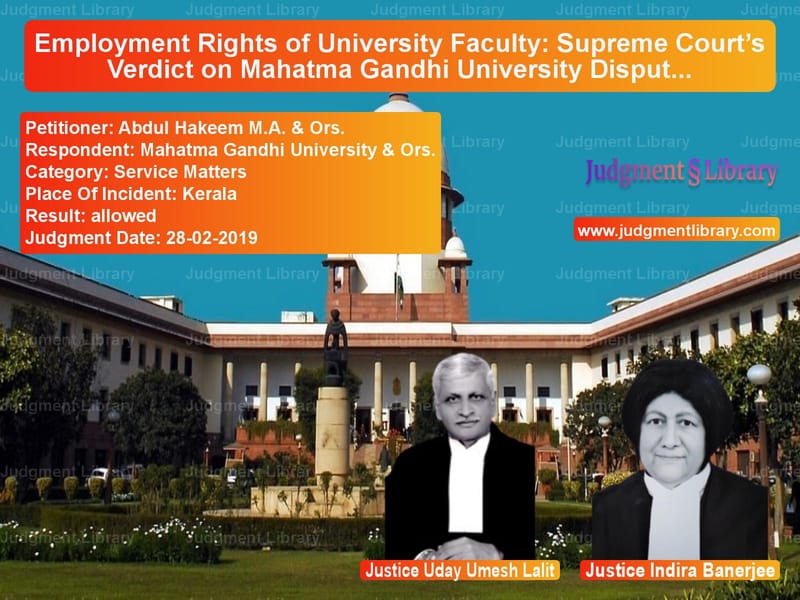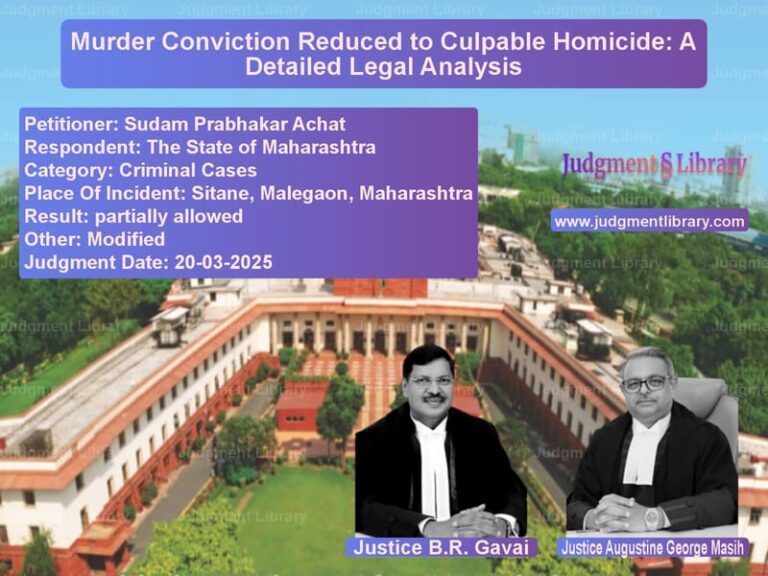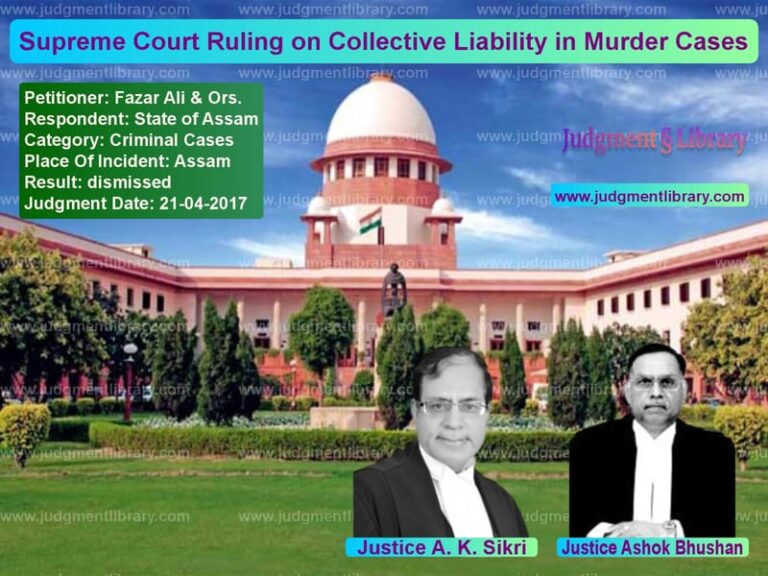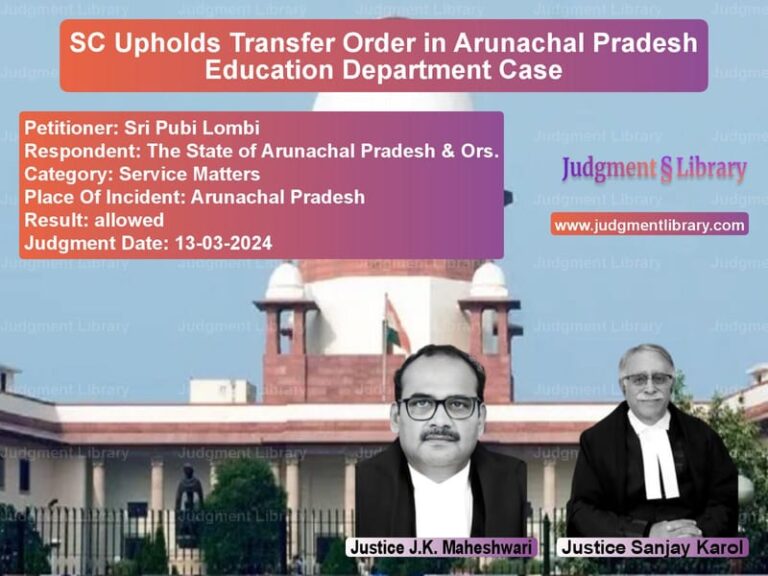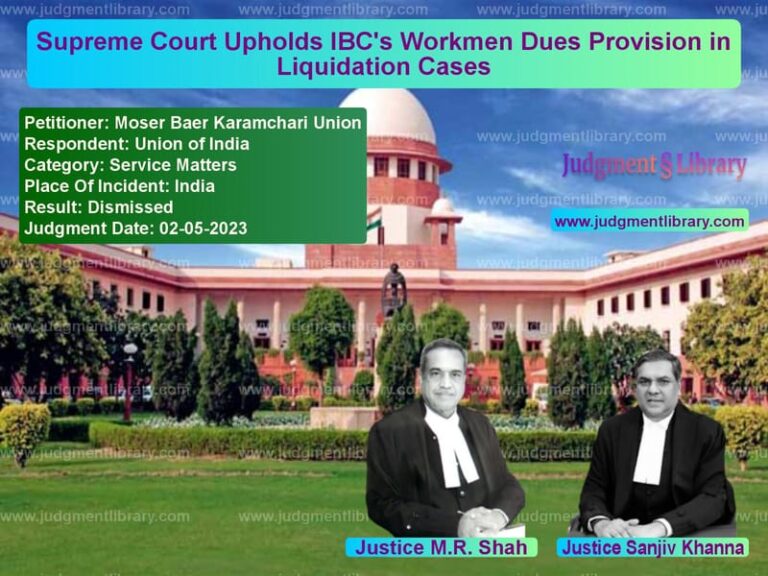Employment Rights of University Faculty: Supreme Court’s Verdict on Mahatma Gandhi University Dispute
The Supreme Court of India recently delivered a landmark judgment in the case of Abdul Hakeem M.A. & Ors. vs. Mahatma Gandhi University & Ors., addressing the dispute over the employment status of faculty members at Mahatma Gandhi University’s Self-Financing Institutions. The judgment clarifies whether the teachers appointed in these institutions were regular university employees entitled to AICTE pay scales and benefits or temporary staff with limited rights.
Background of the Case
The dispute arose when Mahatma Gandhi University initiated technical education programs and created faculty positions in its University College of Engineering and other affiliated institutions. While the faculty members were selected through a proper recruitment process and their appointments were governed by the university statutes, the university later denied them pay revisions, citing that they were temporary employees of a self-financing institution.
The affected teachers, including the appellants Abdul Hakeem M.A. and others, challenged the university’s decision before the Kerala High Court. A single-judge bench ruled in their favor, affirming their status as permanent employees. However, the university appealed, and the division bench overturned the ruling, leading the teachers to approach the Supreme Court.
Key Issues Before the Supreme Court
- Were the appointments of the faculty members at the University College of Engineering permanent or temporary?
- Did the university have the right to deny pay revisions under AICTE scales to these faculty members?
- Did the university’s later classification of the college as a “self-financing institution” affect the employment rights of its faculty?
- Was there inconsistency in the university’s own documents regarding the employment status of the teachers?
Arguments of the Petitioners (Faculty Members)
The faculty members, represented by their counsel, contended the following:
- Their appointments were made following the due process prescribed in the university statutes and through a proper selection process.
- Their appointment orders did not specify that they were temporary employees.
- The university created their posts through formal resolutions, making them substantive posts.
- The university had, in multiple documents submitted to AICTE and other authorities, described them as permanent faculty.
- The decision to classify them as temporary employees after several years was arbitrary and violated the principles of natural justice.
Arguments of the Respondents (Mahatma Gandhi University)
Mahatma Gandhi University, in its defense, argued:
- The faculty members were recruited for a self-financing institution, and their employment conditions differed from those of regular university faculty.
- Since the institution was self-financed, there was no obligation to provide AICTE pay scales.
- The university had a policy of hiring faculty for a limited duration in these institutions.
- The financial burden of AICTE pay scales would significantly impact the self-financing model.
Supreme Court’s Observations
The Supreme Court examined the university’s resolutions, appointment letters, and AICTE submissions. The court observed:
“The appellants were appointed against substantive posts and were always treated to be on a permanent basis. At no stage were they informed, either through any resolution or through any individual communication, that their appointments were temporary.”
Additionally, the court noted:
“The university, while seeking approval from AICTE, classified these faculty members as permanent employees. It is inconsistent and unfair to now claim that they were merely temporary staff.”
Key Findings of the Supreme Court
- The faculty members were appointed through a proper recruitment process and their posts were created by the university’s resolutions.
- The university had, in multiple documents, classified them as permanent employees to AICTE.
- The university’s claim that the institution was “self-financing” did not override the employment rights of its faculty.
- The retrospective classification of the faculty as temporary was arbitrary and legally untenable.
- The teachers were entitled to AICTE pay revisions effective from the date of their appointment.
Supreme Court’s Verdict
The Supreme Court ruled in favor of the faculty members and reinstated the Kerala High Court’s single-judge decision. The court directed Mahatma Gandhi University to:
- Recognize the faculty members as permanent university employees.
- Provide them with AICTE pay scales and all associated benefits.
- Issue formal orders confirming their status within three months.
Implications of the Judgment
This judgment sets a significant precedent for faculty members in self-financing institutions affiliated with universities. The key takeaways from the ruling include:
- Universities cannot arbitrarily reclassify faculty members after years of service.
- Employment status should be determined based on appointment letters, recruitment procedures, and university resolutions.
- Self-financing institutions under universities must adhere to fair employment practices.
- Pay revisions recommended by AICTE cannot be denied based on financial constraints.
Conclusion
The Supreme Court’s ruling in the Abdul Hakeem M.A. & Ors. vs. Mahatma Gandhi University case reaffirms the principles of employment security and fair treatment for university faculty. By emphasizing the importance of formal resolutions, appointment letters, and university representations to external bodies like AICTE, the court ensured that employees cannot be unfairly deprived of their rightful benefits. This verdict serves as a crucial legal precedent for faculty members working in self-financing institutions across India.
Petitioner Name: Abdul Hakeem M.A. & Ors..Respondent Name: Mahatma Gandhi University & Ors..Judgment By: Justice Uday Umesh Lalit, Justice Indira Banerjee.Place Of Incident: Kerala.Judgment Date: 28-02-2019.
Don’t miss out on the full details! Download the complete judgment in PDF format below and gain valuable insights instantly!
Download Judgment: Abdul Hakeem M.A. & vs Mahatma Gandhi Unive Supreme Court of India Judgment Dated 28-02-2019.pdf
Direct Downlaod Judgment: Direct downlaod this Judgment
See all petitions in Employment Disputes
See all petitions in Promotion Cases
See all petitions in Public Sector Employees
See all petitions in Recruitment Policies
See all petitions in Termination Cases
See all petitions in Judgment by Uday Umesh Lalit
See all petitions in Judgment by Indira Banerjee
See all petitions in allowed
See all petitions in supreme court of India judgments February 2019
See all petitions in 2019 judgments
See all posts in Service Matters Category
See all allowed petitions in Service Matters Category
See all Dismissed petitions in Service Matters Category
See all partially allowed petitions in Service Matters Category

